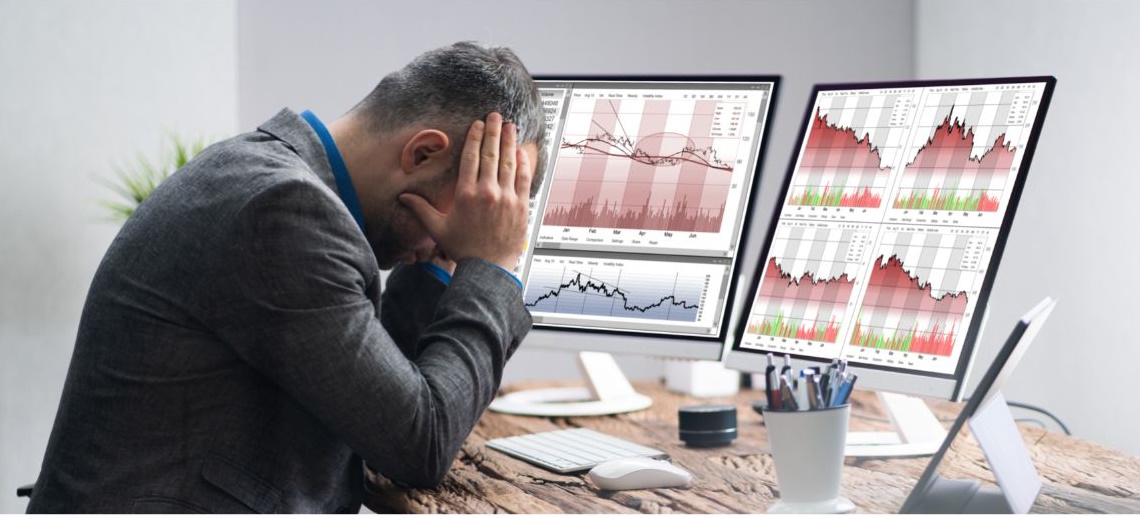Losses are an inevitable part of the Trading game. All traders lose money; whether you’re a beginner or an experienced trader, no one is immune to losses.
It’s natural to feel frustrated, overwhelmed, and even angry when you incur losses. This happens to everyone, and it does not reflect your skills or capabilities in trading.
The first step in dealing with losses is understanding what they are and how they can impact your trading. Losing trades results from market conditions, trading strategies, and individual psychology.
Losses are a natural part of trading. They are a necessary part of the process and should not be viewed as something to be feared or avoided.
The next step is to recognize that losses can occur in any market. Whether you’re trading stocks, options, currencies, or commodities, losses can and will occur.
At all times, be prepared for losses and have a plan in place to manage them. Not just any plan but an effective trading plan and risk management strategy.
The psychological impact of trading losses can be devastating. Many traders have experienced “being in the red” when they suffer a large loss. This can lead to feelings of despair, anger, and even anxiety.
Just remember that losing trades is not the end of the world and that there are ways to cope and move forward.
The Psychological Impact of Losses in Forex Trading
The psychological impact of trading losses is nerve-wracking. It causes despair and hopelessness and leads to losing confidence in your trading ability. When subjected to large losses, some traders may feel like giving up on trading altogether.
Even in life, losses happen. We can’t just avoid them. They are a normal part of trading and are to be expected. However, we stay focused on the long term and keep our emotions in check.
The impact of trading losses can be managed by understanding the emotional triggers leading to impulsive decisions. It’s important to recognize triggers such as fear, greed, and overconfidence.
Once you understand these emotional triggers, you can begin to take steps to manage them and minimize their impact on your trading.
How to Manage Trading Losses
To manage your losses effectively, it’s essential to have a plan in place. This plan should include a risk management strategy and a trading plan.
A risk management strategy should include setting stop losses, limiting your trades to a certain percentage of your account, and having a clear exit strategy.
A trading plan should include things such as your entry and exit points, as well as a plan for managing your losses.
Above all, what’s required from you is discipline in trading. Sticking to your plan and not making impulsive decisions. Impulsive decisions often lead to losses.
How to Deal with Trading Losses
The First step is to accept them. They are a natural part of trading, and do not let them affect your overall trading strategy.
Analyze your losses and look for areas where you can improve. This can help you to identify any weak points in your trading strategy and can help you to take steps to address them.
It’s also essential to take a break when needed. Taking some time away from trading can help you to clear your head and can help you to come back to trading with a fresh perspective.
Finally, I cannot say this enough: keep a positive attitude and remember that trading losses are just a part of the game.
Creating an Effective Trading Plan
Creating an effective trading plan is essential for any trader. A trading plan should include a risk management strategy, entry and exit points, and a plan for managing losses.
A trading plan is not set in stone. As markets change and evolve, your trading plan should also change and evolve. Review your trading plan regularly and make changes as needed.
Also, trading is more than just making money. It’s more than what they call these days – Get Rich Quickly scheme.
It’s about managing risk and making sure that you’re able to stay in the game for the long term. A trading plan should reflect this and should be designed with the long-term in mind.
Tips for Staying Focused and Motivated
One of the most important things when it comes to trading is staying focused and motivated. It’s easy to become overwhelmed and lose focus when trading, especially when dealing with losses.
The best way to stay focused and motivated is to set achievable goals and reward yourself when you reach those goals. This will help to keep you motivated and will help to keep you on track.
Trading is a long-term game so focus on the long term and not get too caught up in the short term. It keeps you focused and motivated.
The other thing is to have time to clear your head, move around, take a walk, or do anything that can get your mind back to focus.
The Importance of Having Realistic Expectations
It’s important to have realistic expectations in trading. Many traders have unrealistic expectations regarding trading, leading to disappointment and frustration.
Trading is a long-term game, and it takes time and dedication to be successful. Expect short-term losses in that game.
One more thing about trading is it’s a game of probabilities. You will not be able to predict the markets perfectly. Your best shot is to focus on your long-term goals and manage your risk accordingly.
Conclusion
Losses are an inevitable part of trading, and it’s important to be prepared for them. The psychological impact of trading losses can be devastating, but it’s important to remember that losses are a natural part of trading and should not be viewed as a failure.
It’s important to have an effective trading plan and risk management strategy to manage your losses. It’s also important to take a break and remember that trading is a long-term game.
It’s also important to stay positive and focus on your long-term goals. Setting achievable goals and rewarding yourself when you reach them can help to keep you motivated and on track.
Finally, it’s important to remember that trading is a game of probabilities and that losses are to be expected. It’s essential to focus on the long-term and to manage your risk accordingly.
No matter what losses you may incur, it’s essential to keep a positive attitude and to remember that losses are part of the process. With focus and dedication, you can become a successful trader and achieve your long-term goals.
Losing everything day trading can be a difficult experience, and it’s essential to have strategies to cope with losses and stay focused on your long-term goals. By understanding the psychological impact of trading losses and having an effective risk management strategy, you can minimize the impact of losses and remain focused on your long-term goals.
- Why Your “Profitable Day” With Prop Firms Isn’t Always What It Seems - January 30, 2025
- Best Forex Brokers Supporting Airtel Money in Uganda - January 14, 2025
- Top Forex Brokers That Accept M-Pesa in Kenya: A Comprehensive Review - January 13, 2025



